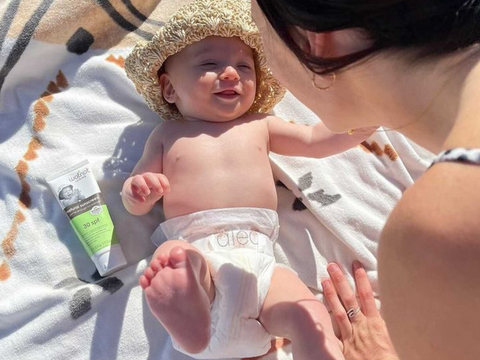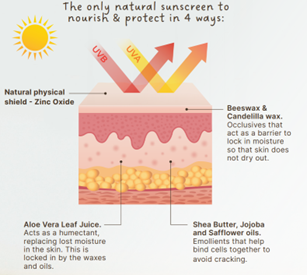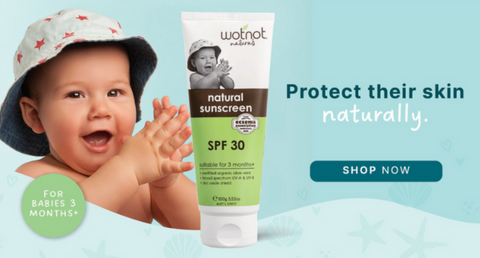As parents, we prioritise the safety and well-being of our little ones above all else. When it comes to sun protection for babies, it is essential to find a baby sunscreen that not only shields them from harmful UV rays but also takes into account their sensitive and delicate skin. Natural sunscreens offer a fantastic alternative to conventional products, as they use gentle, plant-based ingredients that are less likely to cause irritation. In this blog, we will explore the key factors to consider when selecting the best natural sunscreen for your baby.

What is Natural Baby Sunscreen?
Conventional baby sunscreen contains chemical UV absorbers as their active ingredients. These chemicals absorb the sun’s harmful rays and mutate them into heat. Natural baby sunscreen are mineral-based using zinc oxide or titanium dioxide as their active ingredients. These minerals create a physical barrier on the skin, reflecting and scattering harmful UV rays away from your baby's delicate skin.

Does Natural Baby Sunscreen Provide as Much Protection as Other Sunscreens?
Choose a sunscreen with an SPF (Sun Protection Factor) of at least 30. SPF 30 provides high protection against UVB rays, filtering out around 97% of the sun's harmful rays. Higher SPF levels offer only marginal better protection with SPF 50 blocking out 98%. Often the chemicals needed to achieve this additional 1% protection can cause irritation or even stinging for people with sensitive skin.
Choosing The Best Natural Baby Sunscreen
There are 2 things to consider; protection provided by the sunscreen and the brands transparency in disclosing all ingredients.
Protection
The SPF rating on your baby screen related to the protection it provides from UVB rays. UVB rays are primarily responsible for sunburn and the formation of malignant melanoma. Unless the sunscreen also provides broad-spectrum protection it will not protect against UVA rays. UVA rays penetrate the deeper layers of the skin and are responsible for premature skin aging as well as playing a role in skin cancer formation. Ensure that the natural sunscreen you choose for your baby offers both SPF 30 and broad-spectrum protection, guarding against both UVA and UVB rays.
Ingredients list disclosure
Once you’ve identified that the sunscreen contain high-level, broad spectrum protection the next thing is to ensure that you can read ALL ingredients in the product. Because it’s not a legal requirement most sunscreen brands in Australia do not disclose their full ingredient list. Brands that have nothing to hide are happy to be fully transparent with consumers. Only choose a baby sunscreen that lets you know exactly what you are putting on your baby’s skin.
30 SPF Natural & Organic Baby Sunscreen
It’s important to note that an infant’s skin is different from an adult’s. Our bodies produce a pigment called melanin that protects our skin from ultraviolet damage by causes it to darken/tan. An infant produces less melanin than an adult which means that their skin will burn more quickly.
An infant’s skin is thinner and contains more water than an adult. Also the top layer of an infant’s skin called the epidermis doesn’t bond as tightly to the layer below called the dermis. So unlike adult skin that has a tight seal between these layers, an infant’s skin is easier to pass. This is significant when also coupled with the fact that infants lack fully developed detoxification systems.
Babies and infants should be kept out of direct sun exposure but if you need to use a sunscreen choose a sunscreen for sensitive skin with a physical active like zinc that is dispersed in a natural lotion. Read the product label carefully to check if it is hypoallergenic and free from potential irritants such as fragrance, parabens, phthalates, and artificial colours.
Sun Smart
When it comes to safeguarding your baby's skin from the sun's harmful rays, your number one defence is to keep baby out of direct sunlight during the hottest part of the day. Cover exposed skin with appropriate clothing, sunhat and eyewear and babies under 3 months should avoid direct sun exposure. Look for mineral-based, broad-spectrum protection with a suitable SPF level. Prioritise products formulated for sensitive skin. By being sun smart and making an informed choice, you can ensure your little one enjoys the great outdoors safely and comfortably.
Natural Sunscreen For You
When choosing a natural sunscreen for yourself the same guidelines apply. Choose a product that is fully transparent, that lets you know exactly what you are putting on your skin. If you have extra sensitive or very dry skin, a sunscreen that is deeply nourishing with a high level of natural oils will help soothe and hydrate the skin. Natural options are also available for people who prefer a matt finish.








